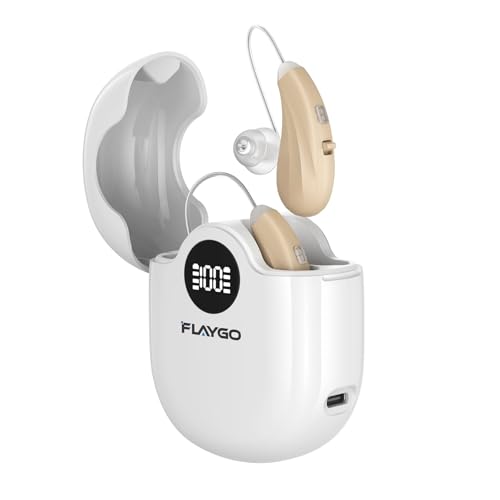To navigate VA disability claims for hearing loss and tinnitus, gather strong medical evidence like audiograms and detailed symptom descriptions that show how your conditions affect daily life. Understand the VA ratings system and verify your documentation clearly establishes the severity and service connection. Be proactive in addressing challenges, prepare for the appeals process if needed, and utilize support resources. If you continue exploring, you’ll find more tips and strategies to improve your chances of success.
Key Takeaways
- Gather comprehensive medical and audiological evidence, including audiograms and detailed symptom descriptions, to support service connection and severity.
- Clearly document how hearing loss and tinnitus impact daily life, emphasizing functional limitations and symptom persistence.
- Seek expert evaluations and detailed medical opinions linking conditions to military service to strengthen your claim.
- Review VA evaluation procedures and ensure all medical records are accurate, complete, and up-to-date to avoid claim delays.
- If denied, analyze the rejection reasons, gather additional evidence, and consider legal or veteran support resources for effective appeals.

Flaygo Hearing Amplifiers, Otc Hearing Aids For People With Hearing Loss, Sound Quality Restoration, Intelligent Noise Reduction, Standby 80h, One-Button Operation, Comfortable Wearing, White
Digital Chip, HIFI Sound Quality:Hearing amplifiers have a built-in 16-channel digital chip with intelligent noise reduction technology that...
As an affiliate, we earn on qualifying purchases.
Understanding VA Disability Ratings for Hearing Conditions

Understanding VA disability ratings for hearing conditions can seem complex, but knowing how the system works helps you better navigate the process. Your rating depends on the severity of your hearing loss and tinnitus, as determined by specific criteria. For hearing loss, the VA uses audiometric testing results to assign a percentage, which influences your benefits. If you use a hearing aid, it indicates a level of hearing impairment that the VA considers when assigning your rating. For tinnitus, the VA typically assigns a 10% rating if the condition is persistent and bothersome. Managing tinnitus effectively can support your claim, but the rating mainly reflects the impact on your daily life. Additionally, understanding the importance of attention to detail during the evaluation process can significantly influence your claim’s outcome. Recognizing how examinations are conducted can also help you prepare for assessments and present your case more effectively. Being familiar with VA evaluation procedures can further improve your understanding of how your condition is assessed, leading to better advocacy for your benefits. Proper documentation of your symptoms and their effects, including symptom severity, can also influence your rating outcome, ensuring all relevant aspects are considered. Understanding these factors helps clarify how your condition translates into a disability rating and potential benefits.

Audien Hearing ATOM PRO 2 Wireless Rechargeable OTC Hearing Aids, Premium Comfort Design and Nearly Invisible
Hear What Matters, Forget the Rest: Tired of asking, “What?” in conversations? The Atom Pro 2 is here...
As an affiliate, we earn on qualifying purchases.
Gathering and Presenting Medical Evidence Effectively

To strengthen your claim, you need to gather solid medical record documentation that clearly shows your hearing issues. Getting expert medical opinions can support your case and provide vital insights, while detailed descriptions of your symptoms help establish their impact. Presenting this evidence clearly and effectively can make a significant difference in your VA disability claim.
Medical Record Documentation
Gathering and presenting medical evidence effectively is vital in supporting your VA disability claim for hearing loss and tinnitus. Accurate medical records are essential, so ensure your documentation reflects your condition clearly and consistently. Verify the accuracy of your medical records, correcting any errors or gaps that could weaken your case. Pay attention to the documentation timeline; timely records from healthcare providers strengthen your claim by showing ongoing treatment and symptoms over time. Keep copies of all tests, audiograms, and doctor’s notes related to your hearing issues. Well-organized, precise records help establish the severity and persistence of your condition, making it easier for the VA to understand your situation and make a fair decision. Incorporating diverse design options for your medical documentation, such as detailed notes and supporting images, can enhance your evidence presentation. Additionally, utilizing automation tools can assist in managing and organizing your medical records efficiently. To further strengthen your case, consider including detailed symptom descriptions that clearly illustrate the impact of your hearing loss and tinnitus on daily life and work activities. Furthermore, emphasizing medical record accuracy ensures your evidence is reliable and credible, which is crucial for a successful claim. Staying informed about data privacy challenges can help you safeguard your sensitive health information during the documentation process.
Expert Medical Opinions
Expert medical opinions can considerably strengthen your VA disability claim by providing professional evaluations that clarify the connection between your military service and your hearing issues. A well-documented opinion can highlight the severity of your tinnitus and how it’s linked to your service, supporting your case. When seeking medical evaluations, ask your provider about tinnitus management options, such as sound therapy or coping strategies, and how they impact your daily life. Additionally, if you use hearing aids, have your provider explain how hearing aid technology improves your hearing and quality of life. Clear, detailed medical opinions that include these aspects can make a significant difference in the success of your claim, providing the VA with concrete evidence of your condition and its impact. Expert evaluation can also help demonstrate the long-term effects of hearing loss and tinnitus on your overall well-being. Considering proper gear shifting techniques and regular maintenance can help prevent further damage to your hearing health over time. Incorporating comprehensive medical evidence from qualified providers can further enhance the strength of your claim by providing detailed documentation of your condition, especially when supported by evidence-based assessments that emphasize the importance of professional judgement in evaluating your hearing issues.
Clear Symptom Descriptions
Accurately describing your hearing loss and tinnitus symptoms is essential for building a strong VA disability claim. Clear symptom descriptions help medical professionals and VA evaluators understand your condition’s impact. Use descriptive language to detail how your hearing difficulties affect daily activities, such as conversations or environmental sounds. Be specific about symptoms like ringing frequency, loudness, and how tinnitus fluctuates. Clearly articulating your symptoms guarantees symptom clarity and prevents misunderstandings. Avoid vague statements like “I have trouble hearing,” and instead specify situations where your hearing or tinnitus worsens. Providing precise, detailed descriptions allows your medical evidence to reflect the true severity of your condition, which can influence compensation levels, strengthening your claim and improving your chances of a favorable outcome. Additionally, including information about the presence of air purifier features and technology, such as noise levels and filtration effectiveness, can help illustrate how environmental factors may exacerbate your symptoms and support your case. Incorporating detailed symptom tracking over time can also demonstrate the consistency and progression of your condition to support your claim effectively.

CUEME Hearing Aids - OTC Rechargeable Hearing Aids for Seniors, Clear Sound, Up to 48 Hours of Battery Life, 3 Sizes of Earbuds, Portable Charging Case Included, Automatic On/Off
【New Generation Noise Reduction Chip】The new generation chip can effectively filter out 90% of background noise, while accurately...
As an affiliate, we earn on qualifying purchases.
Navigating the Application Process and Required Documentation

Understanding the application process for VA disability benefits related to hearing loss and tinnitus can seem overwhelming at first, but understanding the necessary steps and documentation makes it more manageable. You’ll need to gather medical records, service documentation, and personal statements to support your claim. Veteran testimonials often highlight the importance of detailed symptom descriptions and consistent communication. Keep in mind legal considerations, such as ensuring all evidence is accurate and submitted on time, to avoid delays. When preparing your application, consider the following:
- Collect exhaustive medical and service records
- Write clear, detailed personal statements about your symptoms
- Seek advice from VA representatives or legal experts if needed
- Recognize the significance of medical evidence in establishing your claim and its impact on the approval process
Staying organized helps you navigate the process confidently and increases your chances of a successful claim.

ELEHEAR-Beyond Pro Hearing Aids, Bluetooth OTC Hearing Aids for Seniors and Adults, Premium Sound Algorithm with VocClear 2.0, 30% Clearer Speech, Music Mode & Enhanced App, Bluetooth Streaming
Ultra-clear, Natural Sound - Powered by VocClear 2.0 technology that delivers 30% clearer speech, ELEHEAR-Beyond Pro hearing aids...
As an affiliate, we earn on qualifying purchases.
Common Challenges and How to Overcome Them

You might face challenges in gathering strong evidence to support your claim and charting the complex VA process. These obstacles can feel overwhelming, but with the right approach, you can overcome them. Let’s explore effective strategies to strengthen your case and simplify the application journey. Ensuring your documentation includes vetted information for effectiveness and safety can significantly improve your chances of success. Recognizing trust issues in relationships may help you identify patterns that affect your emotional well-being during this process. Additionally, understanding juice detox side effects can help you prepare for potential health impacts if considering dietary changes during this stressful time. Being aware of skincare patch application timing can also be useful if you incorporate topical treatments into your routine to support skin health during this period. Furthermore, understanding hearing loss and tinnitus and their common causes can help you better document your condition and advocate for your needs.
Gathering Strong Evidence
Gathering strong evidence for hearing loss and tinnitus claims can be challenging because VA requires clear, objective proof to establish service connection. To strengthen your case, focus on concrete evidence like recent medical testing that documents your hearing issues. Additionally, claimant testimonies provide personal insight into how your condition affects daily life, making your statement more compelling. Consider these strategies:
- Obtain detailed medical testing results from audiologists, including audiograms and hearing assessments.
- Collect consistent claimant testimonies that describe your symptoms and their impact over time.
- Gather supporting statements from fellow service members or family who observed your hearing problems.
- Utilize specialized hearing tests to objectively demonstrate the severity of your hearing loss and tinnitus.
- Understanding the lifetime impact of hearing issues can help articulate the ongoing effects of your condition in your claim.
- Familiarizing yourself with relevant audiological evaluations can further substantiate your case and provide comprehensive evidence to support your claim.
Navigating Complex Processes
Managing the VA’s complex claims process can be overwhelming, especially when dealing with hearing loss and tinnitus. One major challenge is understanding how compensation calculations are made, which can seem confusing. To navigate this, you need to stay informed about your claimant responsibilities, such as providing clear medical evidence and timely updates. The VA often requires detailed documentation to support your claim, so being proactive helps prevent delays. Be prepared for the possibility of multiple reviews or requests for additional information. Staying organized and understanding the process reduces stress and improves your chances of a successful outcome. Remember, knowing your responsibilities and how compensation is calculated empowers you to navigate the system more confidently and efficiently.
Tips for Appealing a Denied Claim

When a VA claim for hearing loss or tinnitus is denied, it’s important to understand the appeal process and take proactive steps to strengthen your case. Start by reviewing the denial letter carefully, noting specific reasons for denial. Consider applying effective appeal strategies, such as gathering new medical evidence or obtaining statements from witnesses. Seeking legal advice can also improve your chances, especially if the process feels overwhelming. Here are some tips to help you succeed:
- Collect additional medical records or expert opinions
- Submit a clear, detailed statement explaining your ongoing symptoms
- Consult a VA-accredited attorney or claims agent for guidance
Resources and Support for Veterans Throughout the Process

Finding your way through the VA disability claims process for hearing loss and tinnitus can be complex, but numerous resources and support systems are available to help you succeed. Veteran support organizations, like VFW and DAV, offer guidance, advocacy, and assistance with paperwork. Resource networks connect you with legal experts and VA counselors who understand the intricacies of the claims process. The VA itself provides online tools, such as eBenefits and Claim Support, to track your case and access helpful information. You can also seek support from local veteran centers, which often host workshops and provide personalized assistance. Leveraging these resources ensures you’re well-informed, prepared, and supported at every step, increasing your chances of a successful claim and securing the benefits you deserve.
Frequently Asked Questions
How Long Does the VA Typically Take to Process Hearing Loss Claims?
Processing timelines for VA disability claims can vary, but you might face claim delays that extend the usual timeframe. Typically, it takes around 3 to 8 months for your hearing loss claim to be processed, depending on factors like claim complexity and the workload at the VA. To avoid unnecessary delays, guarantee your application is complete and all required evidence is submitted promptly. Stay patient, and follow up if processing times seem unusually long.
Can Veterans Receive Separate Ratings for Hearing Loss and Tinnitus?
Yes, you can receive separate ratings for hearing loss and tinnitus, even if the conditions overlap. The VA recognizes that these are distinct disabilities, so they evaluate and assign individual ratings based on severity. This means you don’t lose out on benefits if you have both. Make sure your medical evidence clearly distinguishes each condition’s impact, so the VA can accurately assess and rate each disability separately.
What Specific Medical Tests Are Most Effective for Confirming Hearing Damage?
Did you know that audiometric testing is 95% accurate in confirming hearing damage? To get precise results, you should undergo audiometric testing, which measures your hearing sensitivity across different frequencies, and an otoscopic examination, which checks for ear canal or eardrum issues. These tests are essential for diagnosing hearing loss accurately, helping you establish the severity needed for VA disability claims.
Are There Any Ongoing Benefits for Veterans With Fluctuating Hearing Issues?
If you’re experiencing fluctuating hearing issues, you might still qualify for ongoing benefits through the VA. They recognize that hearing conditions can change over time, so you could be eligible for continued support. Make sure to document your symptoms and seek regular evaluations. Staying proactive helps guarantee that your fluctuating hearing issues are properly assessed, increasing your chances of maintaining or updating your benefits as needed.
How Does Age or Service Length Impact VA Disability Ratings for Hearing Conditions?
Think of your hearing health as a story written over time—age impact and service duration shape its chapters. As you age, hearing might fade like a sunset, and longer service can deepen the story’s complexity. These factors influence VA disability ratings, often leading to higher assessments for extended service or age-related decline. Your service duration and age become the brushstrokes painting your unique hearing health picture.
Conclusion
Navigating VA disability claims can feel like crossing a challenging river, filled with complex forms and medical jargon. But with the right evidence and persistence, you can reach the calm shores of approval. Think of each step as building a sturdy bridge—strengthening your case and gaining support. While the journey may seem intimidating, staying informed and proactive helps you turn turbulent waters into a path toward the benefits you’ve earned.










